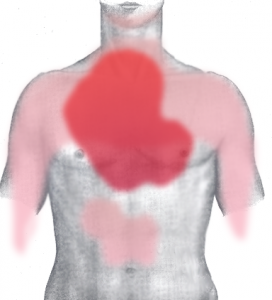Although the name may imply the heart, heartburn has absolutely nothing to do with the heart itself. Heartburn is pain felt in the chest by a burning sensation in the esophagus, which is located close to where the heart is.
Most of the time it comes from the esophagus. The pain often rises in your chest from your stomach and may spread to your neck or throat.
Sleep doctors are aware that sleep apnea causes heartburn a well as persistent urge to urinate. Both symptoms are a result of the diaphragm expanding to its extreme in an attempt to fill the lungs and pushing down on the stomach and bladder. (CPAP machines can often put an end to nighttime heartburn.)
Almost everyone has heartburn sometimes. If you have heartburn very often, you may have gastroesophageal reflux disease (GERD).
Normally when food or liquid enters your stomach, a band of muscle at the end of your esophagus closes off the esophagus. This band is called the lower esophageal sphincter (LES). If this band does not close tightly enough, food or stomach acid can back up (reflux) into the esophagus. The stomach contents can irritate the esophagus and cause heartburn and other symptoms.
However, certain foods may affect the lower esophageal sphincter, making it less effective. That’s how heartburn begins. The stomach produces hydrochloric acid to digest food. The stomach has a mucous lining that protects it from hydrochloric acid, but the esophagus does not.
So, when food and stomach acid regurgitate back into the esophagus, a burning feeling is felt near the heart. This feeling is known as heartburn.
Antacids may be used to relieve heartburn by making stomach juices less acidic, therefore reducing the burning feeling felt in the esophagus. If heartburn becomes frequent or prolonged, medical intervention may be necessary to correct the problem.
Severe heartburn can be a consequence of diet. With that in mind, here’s a list of what to eat/drink and what not to eat/drink:
DO NOT eat:
Tomatoes
Peppers
Citrus fruits
Peppermint
Cheese
Avocadoes
Chocolate
Carbonated beverages
DO eat:
Chamomile tea
Aloe vera juice
Papaya tablets
Potato juice – put a few potatoes in a blender and then mix the result with another type of juice. Believe it or not, this actually works.
Medicines that can cause heartburn include:
- Anticholinergics (e.g., for sea sickness)
- Beta-blockers for high blood pressure or heart disease
- Calcium channel blockers for high blood pressure
- Dopamine-like drugs for Parkinson’s disease
- Progestin for abnormal menstrual bleeding or birth control
- Sedatives for anxiety or sleep problems (insomnia)
- Theophylline (for asthma or other lung diseases)
- Tricyclic antidepressants
Talk to your doctor if you think one of your medicines may be causing heartburn. Never change or stop taking medicine without talking to your doctor first.
Home Care
You should treat heartburn because reflux can damage the lining of your esophagus. This can cause serious problems over time. Changing your habits can be helpful in preventing heartburn and other symptoms of GERD.
The following tips will help you avoid heartburn and other GERD symptoms. Talk to your doctor if you’re still bothered by heartburn after trying these steps.
First, try and avoid all the delicious foods and drinks that can trigger reflux, such as:
- Alcohol
- Caffeine
- Carbonated drinks
- Chocolate
- Citrus fruits and juices
- Peppermint and spearmint
- Spicy or fatty foods, full-fat dairy products
- Tomatoes and tomato sauces
Next, try changing your eating habits:
- Avoid bending over or exercising just after eating.
- Avoid eating within 3 – 4 hours of bedtime. Lying down with a full stomach cause the stomach contents to press harder against the lower esophageal sphincter (LES).
- Eat smaller meals.
Make other lifestyle changes as needed:
- Avoid tight-fitting belts or clothes that are snug around the waist. These items can squeeze the stomach, and may force food to reflux.
- Lose weight if you are overweight. Obesity increases pressure in the stomach. This pressure can push the stomach contents into the esophagus. In some cases, GERD symptoms go away after an overweight person loses 10 – 15 pounds.
- Sleep with your head raised about 6 inches. Sleeping with the head higher than the stomach helps prevent digested food from backing up into the esophagus. Place books, bricks, or blocks under the legs at the head of your bed. You can also use a wedge-shaped pillow under your mattress. Sleeping on extra pillows does NOT work well for relieving heartburn because you can slip off the pillows during the night.
- Stop smoking. Chemicals in cigarette smoke weaken the LES.
- Reduce stress. Try yoga, tai chi, or meditation to help relax.
If you still do not have full relief, try over-the-counter medications:
- Antacids, like Maalox, Mylanta, or Tums help neutralize stomach acid.
- H2 blockers, like Pepcid AC, Tagamet, and Zantac, reduce stomach acid production.
- Proton pump inhibitors, like Prilosec OTC, stop nearly all stomach acid production.
When to Contact a Medical Professional
Get urgent medical care if:
- You vomit material that is bloody or looks like coffee grounds.
- Your stools are black (poop) (like tar) or maroon.
- You have a burning feeling and a squeezing, crushing, or pressure in your chest. Sometimes people who think they have heartburn are having a heart attack.
Call your doctor if:
- You have heartburn often or it doesn’t go away after a few weeks of self-care.
- You lose weight that you didn’t want to lose.
- You have trouble swallowing (food feels stuck as it goes down).
- You have a cough or wheezing that does not go away.
- Your symptoms get worse with antacids, H2 blockers, or other treatments.
- You think one of your medicines may be causing heartburn. Do NOT change or stop taking your medicine on your own without talking to your doctor first.

